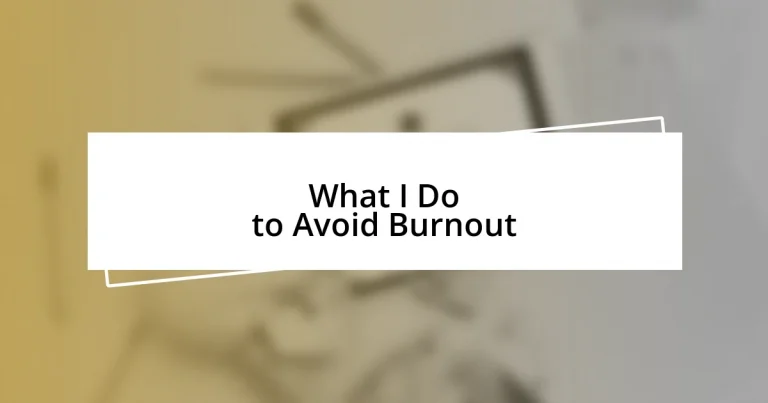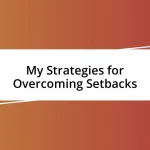Key takeaways:
- Recognizing signs of burnout is crucial; emotional detachment and fatigue indicate the need for a break.
- Setting clear boundaries prevents overcommitment, enhances productivity, and fosters self-care, helping maintain a healthy work-life balance.
- Regularly evaluating wellbeing through self-check-ins and journaling aids in identifying stressors and encourages proactive self-care strategies.
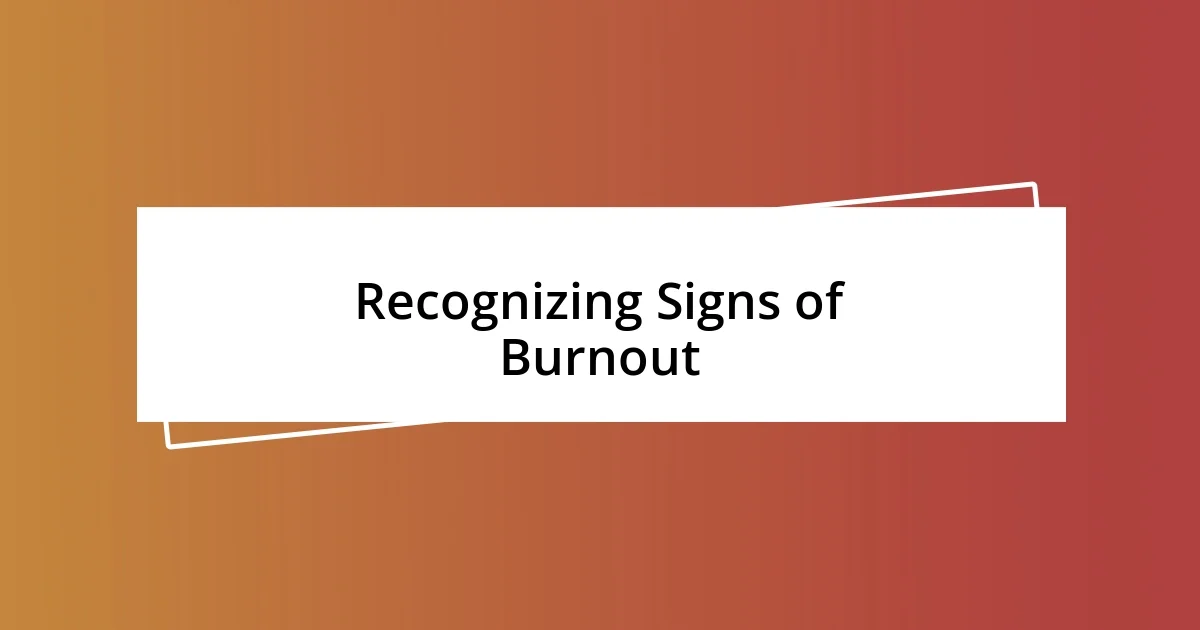
Recognizing Signs of Burnout
Recognizing the signs of burnout can sometimes feel like a daunting task, especially when you’re caught in the whirlwind of everyday responsibilities. I remember a time when I was constantly fatigued yet pushed myself to keep going, dismissing my exhaustion as typical work stress. Reflecting on that experience, I now understand how critical it is to pay attention to both physical and emotional signals, such as persistent tiredness or a growing sense of detachment from my work.
One day, after a particularly long week, I realized I couldn’t enjoy my favorite projects anymore. In fact, I found myself feeling irritable over the smallest issues. This emotional distance is a significant red flag that should not be ignored. Have you ever felt that nagging sense of disconnection? That’s often your mind crying out for a break.
Another aspect I’ve learned to watch for is the way burnout can manifest in our relationships. I walked into a gathering with friends feeling completely drained; instead of engaging, I just wanted to retreat into a quiet corner. It hit me: when our mental energy wanes, our emotional connections can falter too. Recognizing these signs—not just in ourselves but in how we interact with others—can be a powerful step toward reclaiming our well-being.
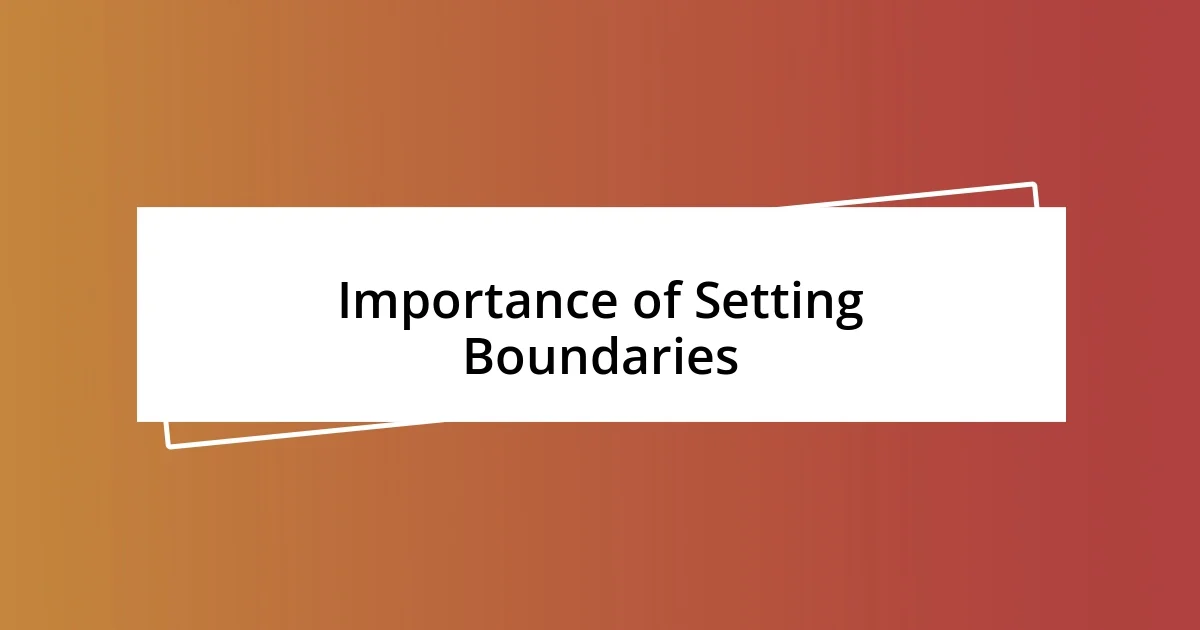
Importance of Setting Boundaries
Setting boundaries is essential for maintaining a healthy work-life balance. I recall a time when I said yes to every request at work, thinking it would boost my reputation. However, I quickly felt overwhelmed and began to resent tasks that I initially enjoyed. Establishing clear boundaries taught me that it’s okay to say no; this simple act can protect my mental health and ensure that I have the energy to engage with my work meaningfully.
Here are a few reasons why setting boundaries is so important:
- Prevents Overcommitment: I learned that turning down extra responsibilities helps me focus on my priorities without spreading myself too thin.
- Enhances Productivity: By limiting distractions, I’ve noticed an increase in my efficiency and creativity.
- Promotes Self-Care: Making time for myself has become a non-negotiable, allowing me to recharge and return to work with renewed vigor.
- Improves Relationships: Healthy boundaries also foster better interactions, as I’m more present and engaged when I’m not overwhelmed by my commitments.
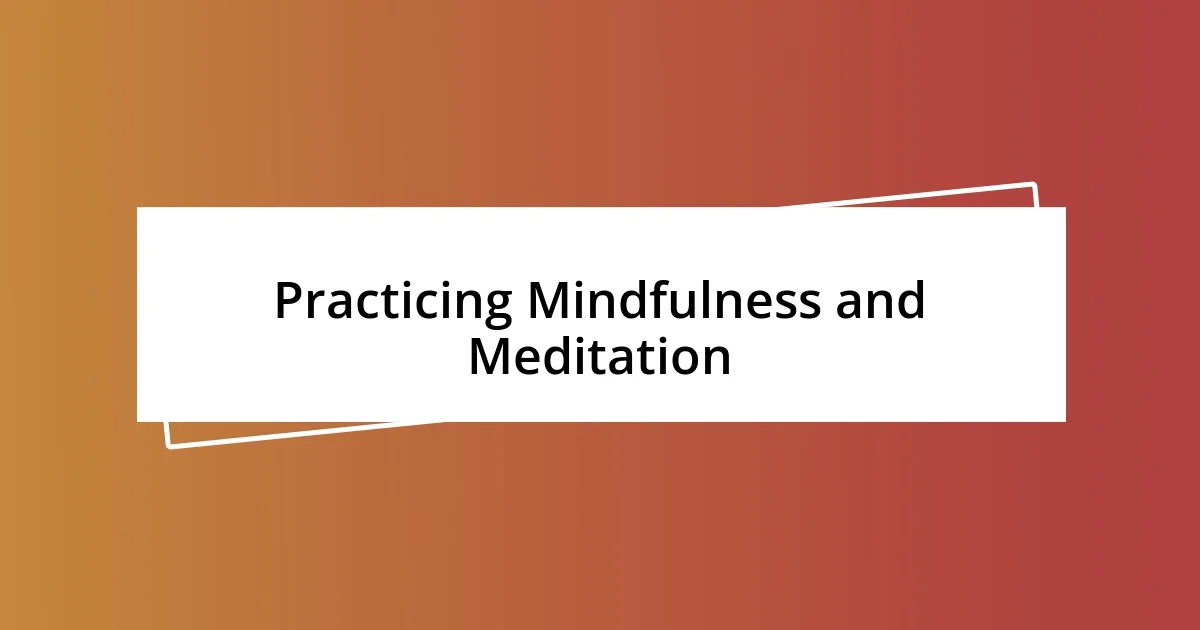
Practicing Mindfulness and Meditation
Practicing mindfulness and meditation has completely transformed my approach to daily stress. On particularly overwhelming days, I carve out just a few minutes to focus on my breathing. It’s amazing how something as simple as inhaling deeply brings me back to the present moment and calms my racing thoughts.
I’ve discovered that regular mindfulness practice helps me to observe my thoughts without judgment. When I first started meditating, I often battles with intrusive thoughts, fighting against them instead of acknowledging their presence. Gradually, I learned to let these thoughts pass like clouds in the sky, allowing me to reclaim my mental space. This shift in perspective has been invaluable—have you tried observing your thoughts instead of wrestling with them?
| Mindfulness | Meditation |
|---|---|
| Focus on the present moment | Structured practice for deep relaxation |
| Can be integrated into daily tasks | Typically a set time, often in silence |
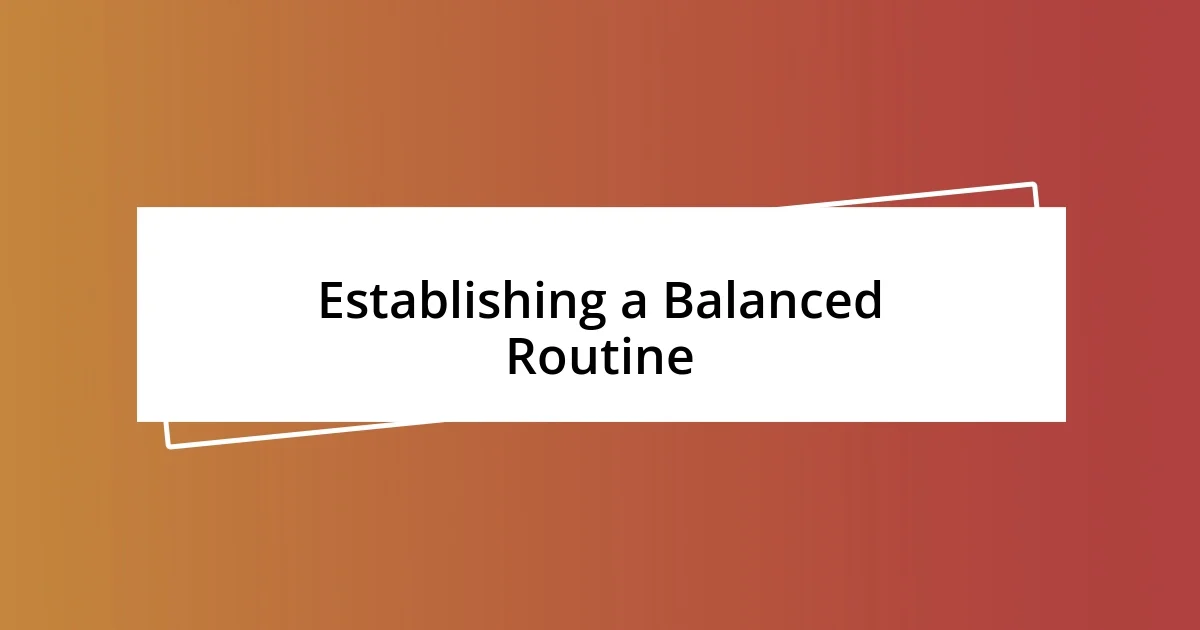
Establishing a Balanced Routine
Establishing a balanced routine is crucial in my journey to avoid burnout. I remember the days when I used to wake up, rush through tasks, and get lost in a chaotic schedule. It’s taken time, but now I prioritize my daily activities to ensure I allocate specific times for both work and leisure. Don’t you find that when you set clear time slots for work, family, and personal interests, it feels less like a juggling act and more like a well-rehearsed performance?
Incorporating regular breaks into my routine has also played a significant role in sustaining my energy. I always set reminders on my phone to take a few minutes every hour to stretch or enjoy a cup of tea. When I first implemented this, I felt guilty for stepping away from my desk. However, I soon realized that these little pauses allowed my mind to recharge and improve my focus when I returned to my tasks. Have you tried stepping out for a quick walk or even just closing your eyes for a moment?
Moreover, I make it a point to ensure that my evenings are a sanctuary for unwinding. I dedicate time to reading, cooking, or engaging in hobbies I love without the interference of work-related thoughts. On weekends, creating a flexible schedule that balances chores and downtime has allowed me to savor my time off. When was the last time you truly enjoyed your weekend without the looming pressure of Monday? Embracing this approach has led to a newfound appreciation for both work and relaxation, making my routine feel fulfilling rather than draining.
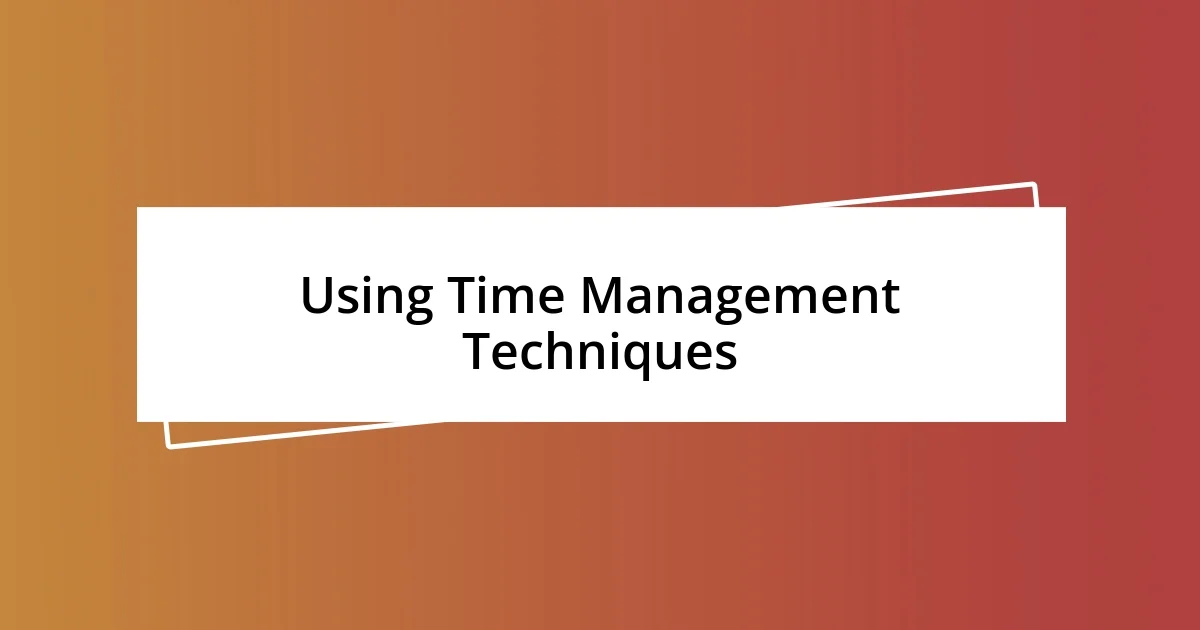
Using Time Management Techniques
Time management techniques have been a game changer in my life. I often find myself using strategies like the Pomodoro Technique, where I work in focused bursts of 25 minutes followed by short breaks. This method surprisingly made me more productive and less fatigued. Have you ever noticed how a sense of urgency can actually make tasks feel more manageable?
Another approach I’ve embraced is prioritizing tasks on a daily basis. Each morning, I create a “must-do” list, noting down the essential tasks that demand my attention. I remember a time when everything felt equally important, and I often ended up overwhelmed. By distinguishing between urgent and important activities, I’ve learned to allocate my energy more efficiently. How do you decide what deserves your focus each day?
I also use digital tools to keep everything organized. Calendar apps have been particularly helpful in scheduling my days while providing reminders for crucial deadlines and appointments. I can’t stress enough how liberating it is to visualize my week and see exactly where my time is going. Have you tried using technology to track your commitments? Finding a system that works for you can be the key to feeling in control rather than swept away by the tide of responsibilities.
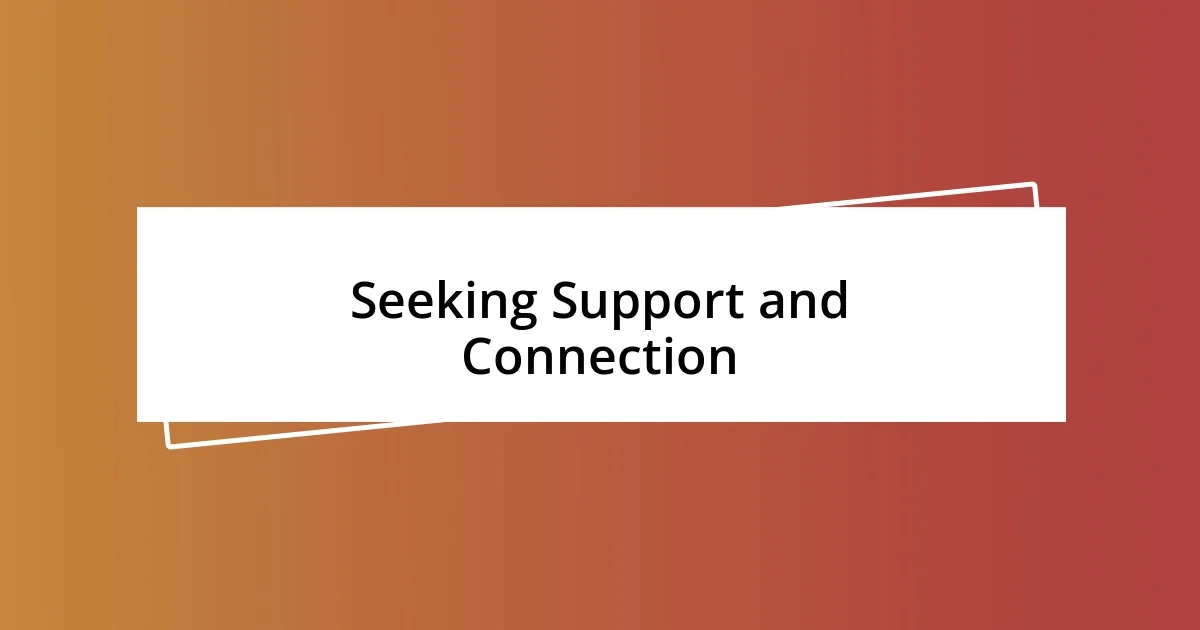
Seeking Support and Connection
Seeking support and connection is something I truly value, particularly in times of stress. I remember a particularly hectic period at work when I felt isolated and overwhelmed. Reaching out to friends and colleagues not only provided emotional support but also opened up avenues for collaboration and shared problem-solving. Have you ever noticed how just a simple chat can lighten the load you’ve been carrying?
I find that engaging in community activities has strengthened my ties and rejuvenated my spirit. Volunteering at local charities or participating in group classes has connected me with like-minded individuals who understand the pressures we face today. There’s something incredibly uplifting about being surrounded by others who share a common goal or interest. Have you taken the time to nurture existing relationships or to cultivate new ones?
Additionally, I make it a point to schedule regular catch-ups with my support network, whether through coffee dates or virtual hangouts. I’ve learned that simply checking in on someone often prompts a reciprocal gesture, creating a cycle of support. It’s in these moments that I realize I’m not alone in my struggles; we all share similar experiences in this journey. How do you make time for connection in your life?
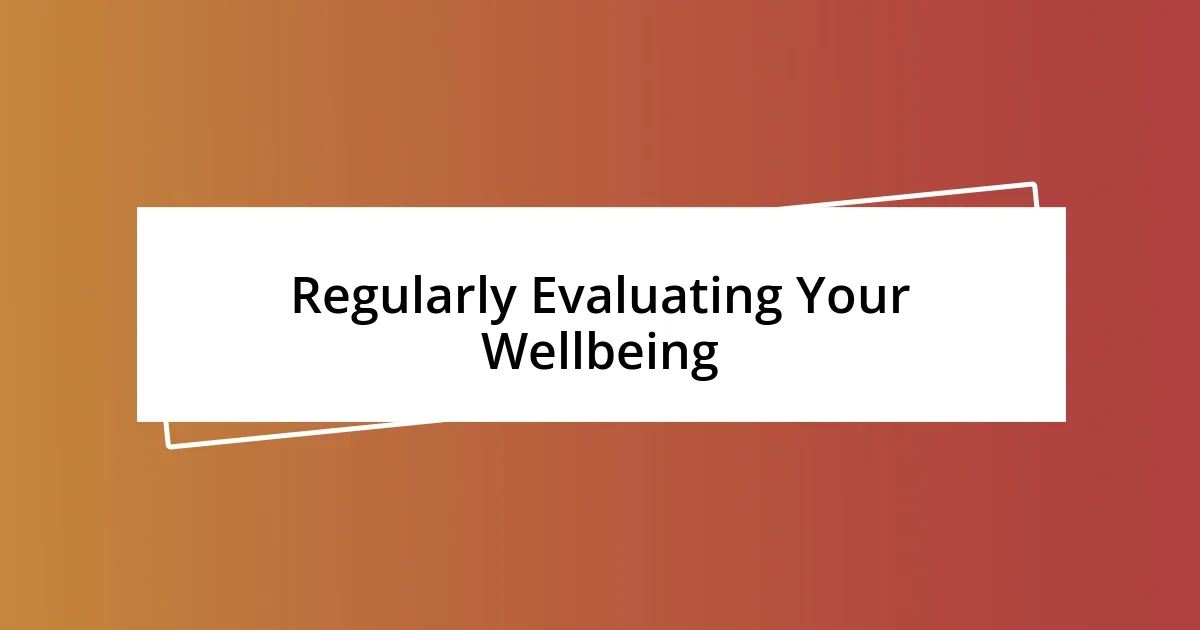
Regularly Evaluating Your Wellbeing
Regularly evaluating my wellbeing has become a cornerstone in my quest to avoid burnout. I take a moment each week to check in with myself, gauging everything from my energy levels to my emotional state. It’s surprising how just dedicating a few minutes to this practice can reveal underlying stressors that I might overlook in the hustle of daily life. Have you ever stopped to explore how you truly feel amidst your busy routine?
I’ve found journaling to be a powerful tool in this reflection process. Whenever I sit down with my journal, I pour out my thoughts and feelings, breaking down the highs and lows of my week. This simple act not only helps me process my emotions but also allows me to notice patterns—like how certain situations consistently drain my energy. Have you considered writing down your feelings? It might just unlock insights that help you steer clear of burnout before it even starts.
Additionally, I embrace regular physical check-ins. Whether it’s through yoga, a brisk walk, or mindfulness meditation, moving my body helps ground me and reconnects me with my needs. I distinctly remember a time when I was so caught up in work that I neglected my physical health. A gentle reminder from my body manifested as exhaustion, prompting me to reassess my priorities. How do you listen to your body’s cues? Tuning into these messages is essential, as it can lead to better self-care and a healthier balance in life.












